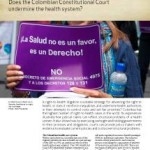Judicial reform has become an increasingly important focus for national governments and international donors, including Norway. This study analyses the role of Norwegian aid to judicial reform in this international context. It has three parts: a theoretical framework to come to grips with the debates on judicial reform; an assessment of lessons from judicial reform […]
The report review steps taken by the Musharraf government to combat honour killings through an examination of legal reforms in the years between 2003- 2006. The phenomenon of honour killings is analysed through the lens of legal pluralism where the negative synergies in the interplay between customary law (riwaj) and religious law (Sharia) has undermined […]
In spite of more than three decades of efforts to promote women’s rights in Bangladesh, the results have been piecemal and only slowly forthcoming, leaving unanswered a number of questions about the interrelations over the last three decades between the legislature, the judiciary system and the civil society in enforcing and promoting gender justice and […]
There is broad agreement in international development on the higher incidence of women amongst the global poor and on the role that gender inequalities play in women’s poverty. Yet there is little understanding of the role complex legal pluralities play in producing gendered forms of poverty. Since the adoption of the United Nations Convention on […]
In many Latin American countries, former military officers are now facing charges of torture, murder, forced disappearance, and genocide committed under the dictatorships of the 1970s and 1980s. Why is this happening now, years after the transition to democracy? And why are courts in some countries leading the way? This comparative analysis, focusing on the […]
Accountability Function of Courts in New Democracies This project aims to investigate to what extent – and under which conditions – courts in new and fragile democracies have been able to say ‘no’ when the executive branch has overstepped its democratic mandate. The research is undertaken in collaboration with local researchers in the regions, as […]
What are the links between transitional justice mechanisms and the degree of violence and reconciliation in a post-war or post-authoritarian society? Countries emerging from major conflict face vast human rights challenges. To address these and reduce the violence, dealing with the past and promoting reconciliation are often considered key priorities. Mechanisms to deal with the […]
Abstract: This project aims to strengthen the competence of Norway as it increasingly becomes a key player on the relations between climate and poverty by improving the knowledge base on Norway’s bilateral relations with South Africa, contribute to a better understanding of the challenges for development aid cooperation to be responsible towards both the environment and […]
Siri Gloppen (2008)
in Health and Human Rights vol. 10 no. 2 pp.21-36
This article offers a framework for exploring litigation as a strategy to advance the right to health by holding governments accountable to human rights norms. Since the 1990s, cases in which people go to court to claim their right to health have increased dramatically in resource-poor countries. With issues ranging from access to health services […]
Camila Gianella (2011)
Bergen: Chr. Michelsen Institute (CMI Brief vol. 10 no. 7) 4 p.
Is right-to-health litigation a suitable strategy for advancing the right to health, or does it reinforce inequalities and undermine health authorities in their attempts to control costs and set fair priorities? Colombia has the highest number of right-to-health cases in the world. Its experiences illustrate how judicial claims can reflect structural problems of a health system. It also shows how, […]

